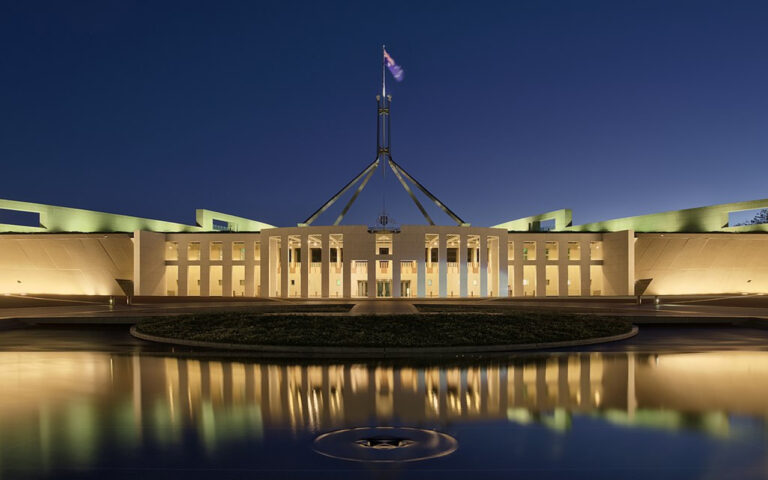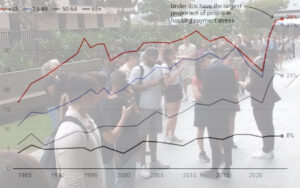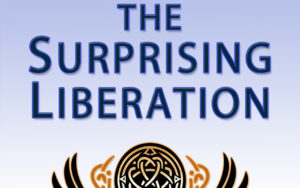The revival of nationalism in Australia over the last ten years has been an enormously positive development for our people. It is entirely to the credit of those brave men who have devoted their lives to the liberation of Australia that nationalist policies are finally being forced into public debate, against the violent opposition of the Canberra regime. However, forcing the government to change its policies, or taking the reins of power ourselves, is not enough on its own in the long term.
As we have seen with Australia’s earlier policies on immigration and nationality, political changes can easily be reversed. In less than 100 years what was once seen as commonsense policy to guide our national development and safeguard our lands is now seen as “racist” and beyond debate. Even in Italy and Germany, the changes made by the revolutionary fascist and national socialist governments failed to last beyond their defeat in war. Aside from a loyal few, millions of fascists and national socialists mysteriously transformed into ardent liberal democrats overnight!
If our people are to survive then a deeper transformation must ultimately take place, and that involves discovering and destroying the root cause of our present crisis. We must be brutally honest in examining ourselves. To simply blame outside groups, like the Jews, exclusively for the suicidal path of our people is delusional self-flattery. The Jews, and other hostile minorities, would never have been able to gain the position of power and influence that they have today if our civilisation had remained healthy. Their malign influence is a symptom, not a cause, of a deeper spiritual sickness.
There are, of course, an almost infinite gradation of opinions on the question of the cause of our decline, ranging from Jewish conspiracy to the domination of society by a caste of managerialist technocrats. But if the problem is traced back far enough, all of these trends originate in liberalism and its values of utilitarianism, rationalism, secularism, individualism, humanism and egalitarianism.
Liberalism has become the default worldview of modernity, so it is difficult for many to understand just how deeply its poison has seeped into our understanding. For those raised in the West, liberalism almost seems to have supplanted reality itself as a source of truth. But we must be totally unsentimental and unsparing in our analysis.
However much elements of liberalism may have helped Europeans to dominate the globe from the 18th to the 20th century, liberalism is entirely destructive when taken to its logical conclusions. There can be little doubt that this is what is happening today.
Utilitarianism and rationalism have restructured our entire societies around economic production and consumption, with all human relations that don’t centre on money being totally devalued (this holds as true for socialism as it does for capitalism).
Secularism has hollowed out the interior and psychic life of most people, reducing them to a retarded psychological state that is only a little above animal life. It is the primary source of the vast tidal wave of metal illness that we see around us.
Individualism and egalitarianism have destroyed all natural hierarchies, annihilating reciprocal social bonds in favour of an endless social war of all against all (which leftism only encourages). It has prevented the creation of any ruling elite worthy of the name.
And as for humanism, it has destroyed all of the higher values of duty, loyalty and struggle. It replaced them with a hypocritical humanitarianism that expresses its undivided respect for the rights of all mankind, even as it condemns its ideological foes to total extermination as enemies of humanity.
Ironically, liberalism’s self-proclaimed goal of liberating man ends up destroying all human dignity and making life for the vast majority of people an unendurable ordeal. On the individual level liberal man becomes a kind of barn animal whose only goals are consumption and reproducing his kind. On the social level the population of the world is turned into a homogenised biomass with no distinctive features, to be shuttled from one production centre to another as the needs of the free market dictate. All higher culture, needless to say, is swamped in a wave of pleb slop.
In other words, liberalism is the systematic cause of the crisis facing our people, even if other actors are the ones exploiting the weaknesses that it creates.
If our people are to have a future worth living in, then it is clear that we must find an alternative to liberalism before it is too late. But in destroying liberalism, would we therefore be condemning our people to a world of squalor, ignorance and technological backwardness? Liberalism has played such a massive role in our civilisation, and in our conception of ourselves, that it is difficult to imagine the European world without it. It is hard to totally discount the argument that liberalism and modernity are inherently intertwined, and that it isn’t possible to have one without the other.
Yet this understanding of liberalism as central to modernity is really little more than a continuation of the old English Whig view of history (which Marxism later appropriated). In this view all peoples must climb the same ladder from savagery to civilisation. The creators of modernity are the commercial bourgeois, who smash the hierarchy of the medieval world, conquer the aristocracy with their newfound wealth, and drag the reluctant masses from their farms into the urban world of factory and tenement house.
The self-interest of the urban merchant elite combines with the ideological liberalism of a small number of scholars, creating a virtuous circle of economic prosperity and liberal institutions, where one reinforces the other. The end result of this linear development is to be the millenarian “end of history”, where politics is entirely abolished because everyone agrees with the liberal consensus and only questions of economic management remain.
Thankfully, this understanding of history barely holds true for Western Europe, let alone the rest of the world. There are many examples of peoples who have modernised without the need for a powerful urban merchant class or liberal political theology. Russia and China both modernised through the pure application of state power, though their elites borrowed the technocratic, utilitarian and rationalist elements of liberalism and combined them with a collectivist social ethic.
More important to us are those states in which the aristocracy took the lead in modernisation, taking on the external trappings of liberalism while retaining their traditional orientation. The leading examples are Prussia (later the key component of Imperial Germany) and the Empire of Japan, which were the leading powers of their day in continental Europe and East Asia. In those two states, the landed military aristocracy of the Junkers and the Samurai were the leading agents of national unification and modernisation. The bourgeois either took a subordinate position, as in Prussia, or were aristocrats themselves, as in Japan. The power of the monarch was not only retained, but strengthened, and the pre-modern culture and religion of the people transformed into a powerful national myth capable of uniting the aristocracy and the masses. Most importantly, rationalism, utilitarianism and the “scientific mindset” were confined to their proper sphere as technical tools for specialists, rather than being allowed to become the pseudo-religion for the masses that they became in the West. Yet these countries were not only militarily powerful, but set the tone of high culture and philosophy during the 19th and early 20th century. They also hold a disproportionate share of the major scientific discoveries of the time.
Of course, the response of the liberal powers was to annihilate Germany and Japan, and deny Russia and China any kind of legitimate authority in the post-war international order. But this says more about liberalism’s hypocritical resort to might-makes-right power politics than it does about its rivals.
The struggle against liberalism has been a titanic civil war within the soul of European man, but it is a battle that must be won if we are to give our people an enduring way out of this crisis. But those waging the fight can take hope from both the past and contemporary examples. It is possible to create a lasting alternative to liberalism without destroying everything we have gained from modernity in the process.
The late Jonathan Bowden put it best when he argued that:
“The modern and that which preceded it are not necessarily in complete opposition. If people with our sorts of values ruled modernity, everything about the society would be, at one level the same, and in every other respect completely different. People would still drive contemporary cars; there’d still be jets; and there’d still be supercomputers, and so on. But the texture and the nature of life would be different in every respect.”
Header image credit: JJ Harrison (https://www.jjharrison.com.au/) – Own work, CC BY-SA 3.0, Link.
























